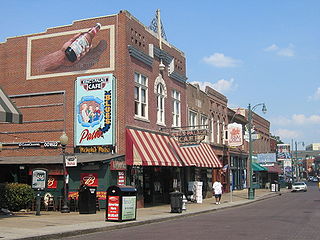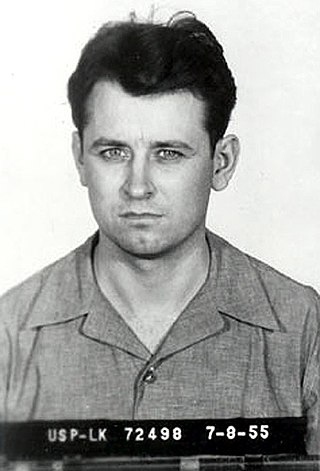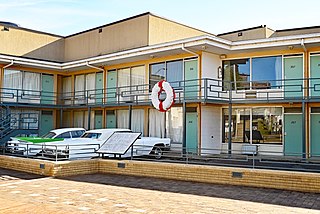Related Research Articles

King: A Filmed Record... Montgomery to Memphis is a 1970 American documentary film biography of Martin Luther King Jr. and his creation and leadership of the nonviolent campaign for civil rights and social and economic justice in the Civil Rights Movement.
Loyd Jowers was an American restaurateur and the owner of Jim's Grill, a restaurant near the Lorraine Motel in Memphis, Tennessee, where Martin Luther King Jr. was assassinated in 1968. For the first 25 years after the assassination of King, Jowers testified that he was in the restaurant at the time of the assassination, a fact supported by the other witnesses in the restaurant.

Ralph David Abernathy Sr. was an American civil rights activist and Baptist minister. He was ordained in the Baptist tradition in 1948. As a leader of the civil rights movement, he was a close friend and mentor of Martin Luther King Jr. He collaborated with King and E. D. Nixon to create the Montgomery Improvement Association, which led to the Montgomery bus boycott, and co-created and was an executive board member of the Southern Christian Leadership Conference (SCLC). He became president of the SCLC following the assassination of King in 1968; he led the Poor People's Campaign in Washington, D.C., as well as other marches and demonstrations for disenfranchised Americans. He also served as an advisory committee member of the Congress on Racial Equality (CORE).

The National Civil Rights Museum is a complex of museums and historic buildings in Memphis, Tennessee; its exhibits trace the history of the civil rights movement in the United States from the 17th century to the present. The museum is built around the former Lorraine Motel, which was the site of the 1968 assassination of Martin Luther King Jr. Two other buildings and their adjacent property, also connected with the King assassination, have been acquired as part of the museum complex.

Alberta Christine Williams King was an American civil rights organizer best known as the mother of Martin Luther King Jr., and as the wife of Martin Luther King Sr. She was the choir director of the Ebenezer Baptist Church. She was shot and killed in the church by 23-year-old Marcus Wayne Chenault six years after the assassination of her eldest son Martin Luther King Jr.

Mason Temple, located in Memphis, Tennessee, is a Christian international sanctuary and central headquarters of the Church of God in Christ, the largest African American Pentecostal group in the world. The building was named for Bishop Charles Harrison Mason, founder of the Church of God in Christ, who is entombed in a marble crypt inside the Temple.

The Tennessee State Museum is a large museum in Nashville depicting the history of the U.S. state of Tennessee. The current facility opened on October 4, 2018, at the corner of Rosa Parks Boulevard and Jefferson Street at the foot of Capitol Hill by the Bicentennial Capitol Mall State Park. The 137,000-square-foot building includes a Tennessee Time Tunnel chronicling the state's history by leading visitors though the museum's permanent collection, a hands-on children's gallery, six rotating galleries, a digital learning center, and a two-story Grand Hall. Exhibitions include significant artifacts related to the state's history, along with displays of art, furniture, textiles, and photographs produced by Tennesseans. The museum's Civil War holdings consists of uniforms, battle flags, and weapons. There is no admission charge for visitors.

The Memphis sanitation strike began on February 12, 1968, in response to the deaths of sanitation workers Echol Cole and Robert Walker. The deaths served as a breaking point for more than 1,300 African American men from the Memphis Department of Public Works as they demanded higher wages, time and a half overtime, dues check-off, safety measures, and pay for the rainy days when they were told to go home.
No Name in the Street is American writer and poet James Baldwin's fourth non-fiction book, first published in 1972. Baldwin describes his views on several historical events and figures: Francisco Franco, McCarthyism, the assassination of Martin Luther King Jr., Malcolm X, Huey Newton, Bobby Seale, Eldridge Cleaver, and the 1963 March on Washington for Jobs and Freedom. The book also covers the Algerian War and Albert Camus' take on it.

Tourism in Memphis includes the points of interest in Memphis, Tennessee such as museums, fine art galleries, and parks, as well as Graceland the Beale Street entertainment district, and sporting events.

James Earl Ray was an American fugitive who was convicted for the assassination of Martin Luther King Jr. at the Lorraine Motel in Memphis, Tennessee, on April 4, 1968. After the assassination, Ray fled the United States and was captured in the United Kingdom. Ray was convicted in 1969 after entering a guilty plea—thus forgoing a jury trial and the possibility of a death sentence—and was sentenced to 99 years of imprisonment.

Martin Luther King Jr., an African-American clergyman and civil rights leader, was fatally shot at the Lorraine Motel in Memphis, Tennessee, on April 4, 1968, at 6:01 p.m. CST. He was rushed to St. Joseph's Hospital, where he died at 7:05 p.m. He was a prominent leader of the civil rights movement and a Nobel Peace Prize laureate who was known for his use of nonviolence and civil disobedience.
The Mountaintop is a play by American playwright Katori Hall. It is a fictional depiction of Martin Luther King Jr.'s last night on earth set entirely in Room 306 of the Lorraine Motel on the eve of his assassination in 1968.
D'Army Bailey was an American lawyer, circuit court judge, civil rights activist, author, and film actor. Born and raised in Memphis, Tennessee, he served as a city councilman in Berkeley, California, from 1971 to 1973.

The Baldwin–Kennedy meeting of May 24, 1963 was an attempt to improve race relations in the United States. Attorney General Robert F. Kennedy invited novelist James Baldwin, along with a large group of cultural leaders, to meet Kennedy in an apartment in New York City. The meeting became antagonistic and the group reached no consensus. The black delegation generally felt that Kennedy did not understand the full extent of racism in the United States. Ultimately the meeting demonstrated the urgency of the racial situation and was a positive turning point in Kennedy's attitude towards the Civil Rights Movement.
The history of the 1954 to 1968 American civil rights movement has been depicted and documented in film, song, theater, television, and the visual arts. These presentations add to and maintain cultural awareness and understanding of the goals, tactics, and accomplishments of the people who organized and participated in this nonviolent movement.
Maxine (Atkins) Smith born in Memphis, Tennessee, United States, was an academic, civil rights activist, and school board official.

King in the Wilderness is an American documentary film about Martin Luther King Jr. that premiered on April 2, 2018 on HBO, focusing on the final two years of his life leading up to his assassination on April 4, 1968.

Conspiracy theories about the assassination of Martin Luther King Jr., a prominent leader of the civil rights movement, relate to different accounts of the incident that took place on April 4, 1968, in Memphis, Tennessee. King was assassinated on the balcony of the Lorraine Motel, the day after giving his final speech "I've Been to the Mountaintop". Claims soon arose over suspect aspects of King's assassination and the controversial role of the alleged assassin, James Earl Ray. Although his guilty plea eliminated the possibility of a trial before a jury, within days, Ray had recanted and claimed his confession was forced. Suspicions were further raised by the confirmation of illegal surveillance of King by the FBI and the CIA, and the FBI's attempt to prompt King to commit suicide.
The Loyd Jowers trial, officially the King family vs. Loyd Jowers and other unknown co-conspirators, was an American wrongful death civil suit brought by the family of Martin Luther King Jr. against Loyd Jowers, following his claims of a conspiracy in the assassination of the civil rights leader in 1968. The jury would eventually decide in 1999 that there was a conspiracy perpetrated by Jowers and other conspirators, including various United States government agencies, to murder King and frame James Earl Ray as a patsy.
References
- ↑ Gray, Madison (March 31, 2008). "Martin Luther King: An Assassination Remembered". Time Magazine. Archived from the original on April 5, 2008. Retrieved February 6, 2012.
Kyles arrived at the Lorraine Motel to pick up his friends at 5 p.m. and came to King's room, where he also met up with Rev. Ralph Abernathy.
- 1 2 Holmes, T.J. (October 21, 2011). "Rev. Samuel Kyles - CNN.com Blogs" (Video). Cable News Network. Turner Broadcasting System, Inc. Retrieved February 6, 2012.
T.J. Holmes visits the National Civil Rights Museum in Memphis, Tennessee. It is built around the former Lorraine Motel, where Dr. Martin Luther King, Jr. was assassinated on April 4, 1968.
- ↑ "The Witness: From the Balcony of Room 306 (2009)". Movies & TV Dept. The New York Times . Archived from the original on January 30, 2013. Retrieved February 6, 2012.
Acting Credits, Production Credits, Company Information
- ↑ "About NRCM". National Civil Rights Museum. Retrieved February 6, 2012.
2009 Academy Award nominated documentary, "The Witness: From the Balcony of Room 306"
- ↑ White, Thomas (February 2009). "Meet the Academy Award® Nominees: Adam Pertofsky--The Witness: From the Balcony of Room 306". International Documentary Association. Retrieved January 29, 2012.
I've always had a passion for Dr. King's teachings and the Civil Rights Movement, so when Margaret Hyde, the producer, approached me about doing this film, I was ecstatic. I felt it was a very important piece of history that needed to be documented.
- ↑ "THE WITNESS: From The Balcony of Room 306". BAD West – Black Association of Documentary Filmmakers West. April 6, 2009. Archived from the original on June 19, 2010. Retrieved January 29, 2012.
Everyone, especially Rev. Kyles, participated with the proviso that we didn't seek to personally benefit from the film and that all proceeds would go to the Museum. We know we just couldn't think of making the film any other way. Everyone interviewed in the film donated his or her time and we were able to screen the film at the NCRM in time for the 40th anniversary of Dr. King's assassination commemoration.
- ↑ "HBO: The Witness (Synopsis)". HBO Documentary Category. Retrieved January 30, 2012.
He was there to help keep alive King's legacy and his dream of equal rights for African-Americans. 'Crucifixions have to have witnesses,' says Kyles. 'You can kill the dreamer but you cannot...kill the dream.'
- ↑ "The 81st Academy Awards (2009)". The Oscars. Archived from the original on October 1, 2014. Retrieved February 2, 2012.
The 81st Academy Awards (2009) Nominees and Winners
- ↑ "Palm Springs International Film Festival, 2008". Palm Springs International Film Society. Archived from the original on September 7, 2012. Retrieved February 4, 2012.
WON: Best Documentary Short & Audience Favorite Documentary Short
- ↑ "Aspen Film Shortsfest 2009 Awards". AspenFILM. Retrieved February 5, 2012.
Best Documentary - The Witness: From the Balcony of Room 306 . . . Audience Favorite Award - The Witness: From the Balcony of Room 306
- ↑ "Awards Roundup: April 15–27, 2009". International Documentary Association. Retrieved February 5, 2012.
Nashville Film Festival - Best Short Documentary
- ↑ "2009 Award Winners". RiverRun International Film Festival. Archived from the original on August 8, 2011. Retrieved February 4, 2012.
Best Documentary Short
- ↑ Lloyd, Robert (February 18, 2009). "The Witness: From the Balcony of Room 306". Los Angeles Times. Retrieved February 2, 2012.
a powerful, Oscar-nominated short film . . . We are in the age of the blockbuster documentary, but bigger is not always better. A string quartet can cut deeper than a symphony. This is a chamber piece in which the dominant voice is, inevitably, King's own.